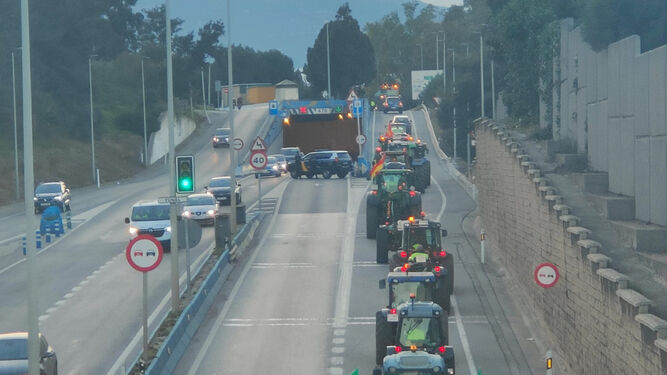The tractor drivers who on Tuesday staged a march from Jimena began their return to their places of origin around 6:00 p.m. after being unable to access the Port of Algeciras, as they had intended to do, as a protest against the crisis affecting the agricultural sector. The collective demands fair prices for their produce, reciprocity in imports from third countries—such as Morocco—and less bureaucracy.
The tractor drivers arrived in Algeciras via the Old Road from Los Barrios around 5:00 p.m. and at San José Artesano, from where they intended to link up to Virgen del Carmen Avenue to reach the Agrarian Regional Office, next to the port control tower, they were told they could not enter the Port of Algeciras. However, local police and national police officers informed them that they could not do so, and after a few minutes of negotiation, they began the journey back. Nevertheless, their protests were noticeable throughout the entire route with traffic delays and the honking of horns, in addition to the banners they displayed on their vehicles.
By 7:00 p.m., the caravan was at La Menacha roundabout, regulated by local police, national police, and the Civil Guard, from where the tractors were returning to Los Barrios via the Old Road.
The tractor drivers, mobilized through social networks, departed from Jimena de la Frontera around 8:00 a.m. with the intention of reaching the Port of Algeciras, although the Civil Guard authorities—who escorted the convoy—suggested concluding the tractor protest at La Menacha industrial estate, at the entrance to Algeciras. The protests are being supported simultaneously across the country.
The convoy of agricultural vehicles first traveled along road A-405 to Venta Los Timbales, near the San Roque Station. From there, the group joined the A-7 to travel to Bahía Plaza shopping center (about 2.5 kilometers), where they arrived around 1:00 p.m.
At this point, a group of Acerinox workers, on indefinite strike since Monday, welcomed the agricultural vehicles with cheers, applause, and expressions of support.
The caravan passed through Los Barrios Station, made a stop for lunch, and around 4:00 p.m., resumed the journey along the old road to reach La Menacha.
"We want to reach the Port of Algeciras, where the trucks arrive with agricultural products from Morocco. In La Menacha, we will only harm Spanish transporters. The Civil Guard wants to prevent us from reaching the Port," explained Pedro Navarro, one of the promoters of the mobilization in Campo de Gibraltar, to Europa Sur.
The mobilization on Tuesday was called for through social networks, while the main agricultural organizations distanced themselves from the initiative. Entities such as ASAJA, COAG, UPA, and Agro-Food Cooperatives of Cádiz are preparing mobilizations for March 21, with the aim of blocking the Port of Algeciras.
Agricultural organizations consider the port of Algeciras "one of the main entry points into the European market for agri-food products imported from third countries, which represent unfair competition for European farmers, in addition to entering without control and without food safety guarantees," they argue.
These complaints are also shared by the farmers mobilized on Tuesday. "Watermelons are in the markets at five euros, while in the fields, it is not worth picking them at the price they pay. It's the same with citrus fruits and many other products," Navarro added to Europa Sur.
Demands of the farmers:
- Lower the demands of the new agri-environmental Common Agricultural Policy (CAP) that drastically reduce production and, in some cases, are impossible to carry out.
- Reduce bureaucratic burdens that result in the loss of many working days and greater involvement of civil servants.
- Make it non-compulsory to leave 4% of the land fallow.
- Eliminate digital books: the EU requires producers to keep a digital notebook where they must record work, treatments, animal management, etc.
- Better manure management: eliminate the rule that will allow manure to be piled up for more than 5 days and spread on the farm for 2 days.
- Commitment not to reduce the reduction of taxes on agricultural diesel. Even implementing some improvements, due to high prices.
- Compliance with price laws, where farmers or ranchers are not forced to sell at a loss.
- Compliance with phytosanitary control of European regulations for all products entering from non-EU countries.
- Commitment to a water management policy consistent with the needs of each territory.
- Clarity in labeling regarding the countries of origin of products and original and final prices.
